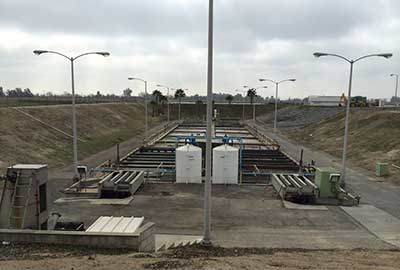Where: Chowchilla, California
Problem: The community’s older wastewater treatment plant is heavily dependent on electrical energy (pumps and mo¬tors) for its operation and needed to be surveyed for efficiency.
Solution: RCAC staff conducted an energy evaluation to determine how the plant can operate more efficiently.
 Chowchilla is an incorporated town in rural Madera County, California, with about 18,720 residents. The town’s wastewater treatment facility is located approximately 1 mile south of its center. The plant was constructed in 1967, with two major modifications since its initial construction. Compared to newer facilities of similar capacity, the Chowchilla plant is mechanically complex and its pumps and motors are heavily dependent on electrical energy, Chowchilla is currently paying approximately $18,000 per month for electricity to run the facility.
Chowchilla is an incorporated town in rural Madera County, California, with about 18,720 residents. The town’s wastewater treatment facility is located approximately 1 mile south of its center. The plant was constructed in 1967, with two major modifications since its initial construction. Compared to newer facilities of similar capacity, the Chowchilla plant is mechanically complex and its pumps and motors are heavily dependent on electrical energy, Chowchilla is currently paying approximately $18,000 per month for electricity to run the facility.
The California State Water Resources Control Board contracts with RCAC through its energy audit program to help communities achieve the highest possible reduction in energy costs. In conducting an onsite evaluation, RCAC staff can better understand how well, or poorly, a wastewater treatment facility functions and can also identify potential ways to conserve energy.
RCAC’s Certified Energy Auditor conducted an energy evaluation of the Chowchilla wastewater treatment facility in December 2015. The final report will present a preliminary analysis of how Chowchilla’s treatment plant can operate more efficiently including how to achieve the most annual energy savings, and keep implementation costs low. Preliminary findings have identified energy conservation opportunities that, if implemented, could potentially reduce energy costs for the facility between 5 and 10 percent annually.
